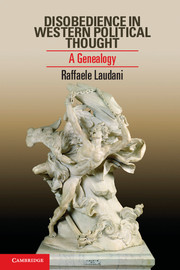4 - When Disobedience Is “Civil”
Published online by Cambridge University Press: 05 June 2014
Summary
The Legacy of a Misunderstanding
It is in this same American historical and political context that Henry David Thoreau's reflection on Civil Disobedience (1849) takes place. In the wake of the radical American tradition, Thoreau, too, considers the government “at best” a mere “expedient” to which individuals have no obligation because they are “men first, and subjects afterward” and therefore have the “right…to do at any time what [they] think right.” Often classified as anarchist, Thoreau's text should instead be interpreted as an attempt to restore the original spirit of the Declaration of Independence from its postrevolutionary ritualization, grafting the emancipative instances of abolitionist struggle (including African American struggle) and the pacifism of the opponents of the Mexican War onto it:
This American government – what is it but a tradition, though a recent one, endeavoring to transmit itself unimpaired to posterity, but each instant losing some of its integrity?…When a sixth of the population of a nation which has undertaken to be the refuge of liberty are slaves, and a whole country is unjustly overrun and conquered by a foreign army, and subjected to military law, I think that it is not too soon for honest men to rebel and revolutionize.
A revolution that, in this “American” perspective, returns to be equivalent to disobedience and resistance: with a clear reference to what is written in the Declaration of Independence, Thoreau states that “all men recognize the right of revolution; that is, the right to refuse allegiance to, and to resist, the government.” More precisely, he speaks of a “peaceable revolution”; this does not, however, mean a “nonviolent” one because, in certain circumstances, we “suppose blood should flow,” because the radicalness of political action depends on the seriousness of what is at stake, on the degree of the authority's unwillingness to recognize the reasons of those revolting, and, above all, on the force that is therefore necessary to break free from the chains of oppression. Thus, without contradicting the principles expressed in 1849, in his Plea for Captain John Brown, he writes, “A man has a perfect right to interfere by force with the slaveholder, in order to rescue the slave…I speak for the slave when I say that I prefer the philanthropy of Captain Brown to that philanthropy which neither shoots me nor liberates me.”
- Type
- Chapter
- Information
- Disobedience in Western Political ThoughtA Genealogy, pp. 91 - 120Publisher: Cambridge University PressPrint publication year: 2013

